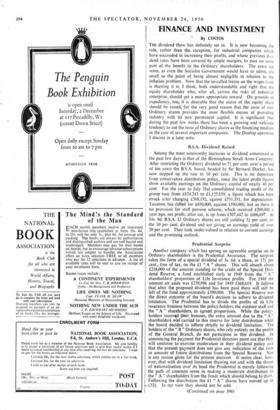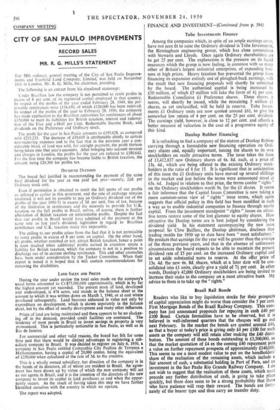FINANCE AND INVESTMENT
By CUSTOS THE dividend thaw has definitely set in. It is now becoming the rule, rather than the- exception, for industrial companies which have succeeded in increasing their profits, and whose previous divi- dend rates have been covered by ample margins, to pass on some part of the benefit to the Ordinary shareholders. The extra net sums, as even the Socialist Government would have to admit, are small to the point of being almost negligible in relation to the inflation problem. Now that the so-called freeze on the wages front is thawing it is, I think, both understandable and right that the equity shareholder who, after all, carries the risks of industrial enterprise, should get a more appropriate reward. On grounds of expediency, too, it is desirable that the status of the equity share should be raised, for the very good reason that the issue of new Ordinary shares provides the most flexible means of providing industry with its new permanent capital. It is significant that during the past few weeks there has been a growing and welcome tendency to use the issue of Ordinary shares as the financing medium in the case of several important companies. The Dunlop operation I discuss in a later-note.
B.S.A. Dividend Raised Among the most noteworthy increases in dividend announced in the past few days is that of the Birmingham Small Arms Company. After restricting the Ordinary dividend to if per cent, over a period of ten years the B.S.A. board, headed by Sir Bernard Docker, has now stepped up the rate to 10 per cent. This is no departure from conservative distribution policy, since the latest profit figures show available earnings on the Ordinary capital of nearly 40 per cent. For the year to July 31st consolidated trading profit of the group rose from £834,243 to £1,125,859, a figure which has been struck after chargipg £568,192, against £531,351, for depreciation. Taxation has &lied- for £850,000, against £590,000, but as there is no provision for staff-pension scheme, which received £200,000 a year ago, net profit, after tax, is up from £507,442 to £606,697. At 34s. 9d. B.S.A. £1 Ordinary shares are still yielding 51 per cent, on the 10 per cent. dividend and are giving an earnings yield of over 20 per cent. They look under-valued in relation to current earnings and the promising outlook.
Prudential Surprise
Another company which has sprung an agreeable surprise on its Ordinary shareholders is the Prudential Assurance. The surprise takes the form of a special dividend of 3s. 6d. a share, or 17f per cent., free of tax, on the £1 " A " shares. This will absorb about £218,000 of the amount standing to the credit of the Special Divi- dend Reserve, a fund established early in 1949 from the " A " shareholders' proportion of Life Insurance profits. For 1948 the amount set aside was £239,996 and for 1949 £368,619. It follows that after the proposed dividend has been paid there will still be left of the fund approximately £390,000. The Special Reserve was the direct outcome of the board's decision to adhere to dividend /imitation. The Prudential has to divide the profits of its Life insurance business between the policy-holders, the outdoor staff and the "A" shareholders, in agreed proportions. While the policy- holders receiviefifeir bonuses, the extra amount due to the " A " shareholders war carried to this reserve for later distribution when the board decided to adhere strictly to dividend limitation. The holders of the "B " Ordinary shares, who rely entirely on the profits of the General Branch, do not participate in this dividend. In announcing the payment the Prudential directors point out that they will continue to exercise moderation in their dividend policy and that the present payment does not give any indication of the time or amount of future distributions from the Special Reserve. Nor is any reason given for the present decision. It seems clear, how- ever, that with dividend limitation thawing out and with the threat of nationalisation over its head the Prudential is merely following the path of common sense in making a moderate distribution to the " A " shareholders from the funds which should belong to them. Following the distribution the 1 " A " shares have moved up to £32f. In my view they should not be sold.
(Contittued on pew 596) FINANCE AND INVESTMENT—(Cominued from p. 594) Tube Investments Finance Among the companies which, in spite of an ample earnings cover, have not seen fit to raise the Ordinary dividend is Tube Investments, the Birmingham engineering group, which has _close Connections with Stewarts and Lloyds. Once again Ordinary shareholders are to get 25 per cent. The exnlanation is the pressure on its liquid resources which the group is now feeling, in common with so many other of Britain's largest industrial enterprises, of expanding busi- ness at high prices. Heavy taxaticiri has prevented the group from financing its expansion- entirely out of ploughed-back earnings, with the result that new financing proposals will shortly be submitted by the board. The -authorised capital is being increased by 10 million, of which 15 million will take the form of 44 per cent. Redeemable Cumurative Ll Preference shares. These shares, it seems, will shortly be issued, while the remaining 5 million £1 shares, as yet unclassified, Will be field in reserve. Tube Invest- ments £1 Ordinary units are now quoted around £64, to give the somewhat low return, of 4 per cent, on the 25 per cent. dividend. The earnings yield, however; is close to 12 per cent, and affords a better measure of valuation in the case of a progressive equity of this kind.
Dunlop Rubber. Financing It is refreshing to find a company of the stature of Dunlop Rubber carrying through a formidable new financing operation on Ordi- nary shares and, equally important, issuing the shares to its own stockhoklers on really attractive terms. The issue takes the form of 13,412,837 new Ordinary shares of 6s. 8d. each, at a price of 13s. 4d., which are being offered to the existing Ordinary stock- holders in the ratio of 8 for 15. It is significant that in anticipation of this issue the £1 Ordinary units have moved up several shillings in the market and just before the terms were announced stood at 65s. 6d. Judged in relation to that price, the terms confer " rights " on the Ordinary stockholders worth 9s. for the £1 shares. It seems a fair inference that the Capital Issues Committee is now taking a more common-sense view of " rights " issue terms, which again suggests that official policy in this field has been modified in such a way as to enable industrial companies to finance through equity capital. From the investment standpoint " rights " issues on attrac- tive terms restore some of the lost glamour to equity shares. How attractive the Dunlop terms are is best judged by considering the dividend yield In his statement accompanying the new issue proposal Sir Clive 'Baillieu, the Dunlop Glrairman, discloses that trading results for 1950 -up to date have been "most satisfactory." He predicts that earnings for the year will be greater than the average a the three previous years, and that in the absence of unforeseen circumstances the board expects to be able to maintain the present dividend rate of 15 per cent, on the increased Ordinary capital and to set aside substantial sums to reserve. At the offer price of 13s. 4d. the new 6s: 8d. shares, which at a later date will be con- solidated into £1 units, clearly give a yield of 74 per cent. In other words, Dunlop's 42,000 Ordinary stockholders are being invited to increase their stake in the company on a most attractive basis. my advice to them is to take up the "rights."
Brazil Rail Bonds Readers who like. to buy liquidation stocks for their prospects of capital appreciation might do worse than consider the 5 per cent. First Mortgage Bonds of the Brazil Railway Company. This com- pany has just announced proposals for repaying in cash £40 per £100 Bond. Certain formalities have to be observed, but it is believed in well-informed quarters that the cheques will go out next February. In the market the bonds are quoted around 144, BO that a buyer at today's price is giving only £4 per £100 for such assets as the company will still retain after making the £40 distri- bution. The amount of these bonds outstanding is £3,500,000, so that the market quotation of £4 ex the coming £40 repayment puts a value on further repayment prospects of approximately £140,000. This seems to me a most modest value to put on the bondholders' share of the realisation of the remaining assets, which include a fair amount of cash, a substantial holding in Port of Para, and an investment in the Sao Paulo Rio Grande Railway Company. I do not wish to suggest that the realisation of these assets, which must precede any further distribution of cash, is going to take place quickly, but there does seem to be a strong probability that those who have patience will reap their reward. The bonds are fortu- nately of the bearer type and thus carry no transfer duty.















































































 Previous page
Previous page